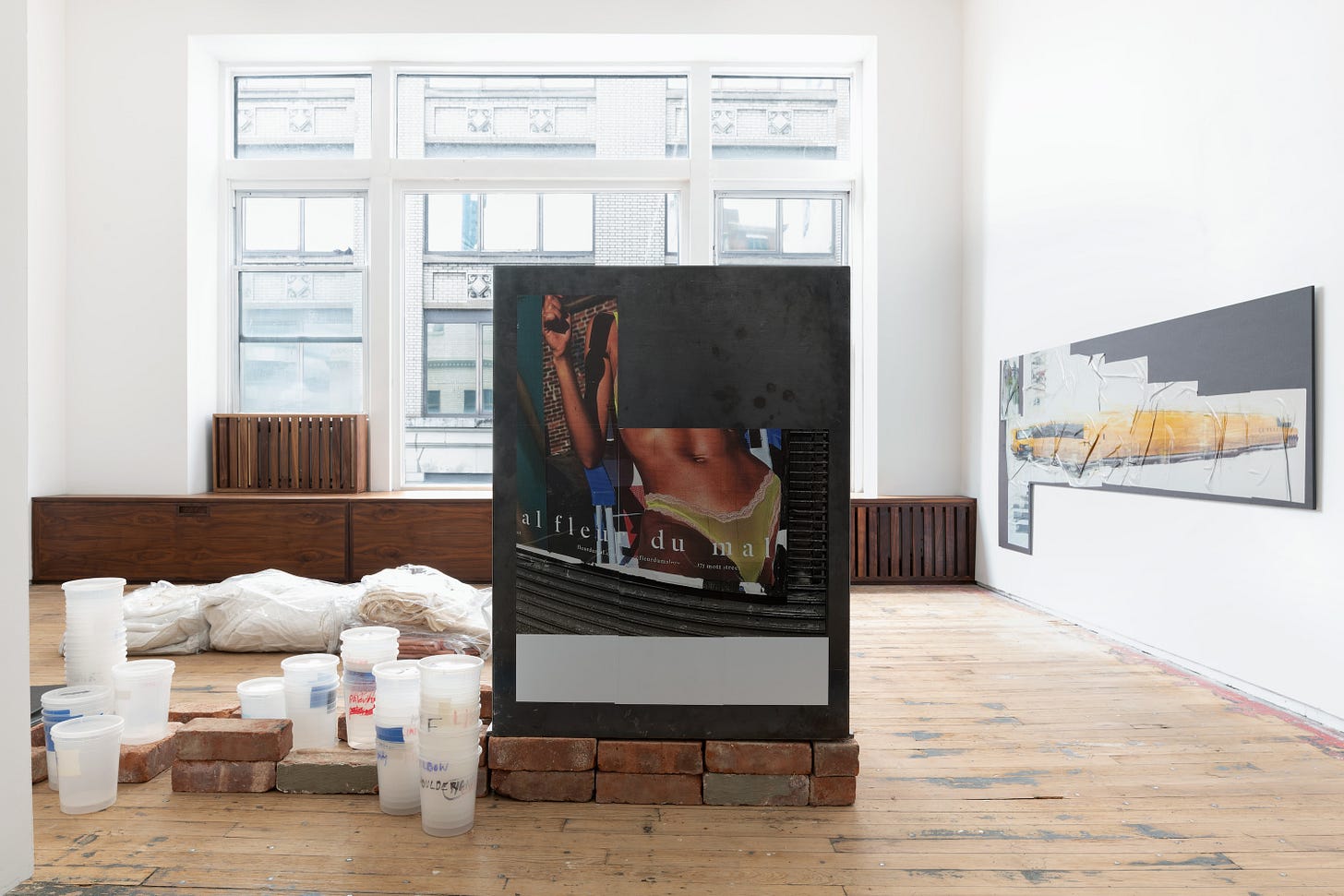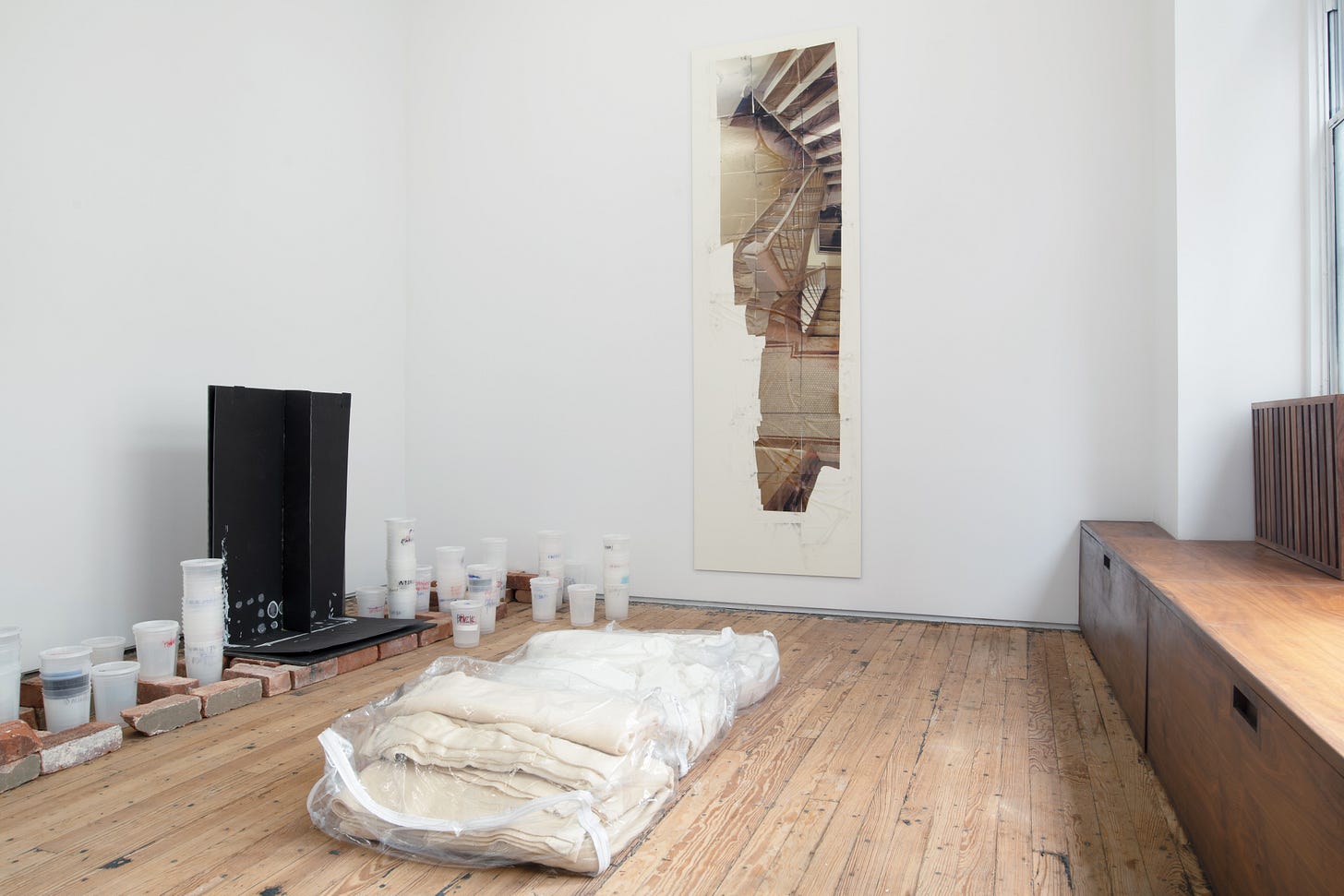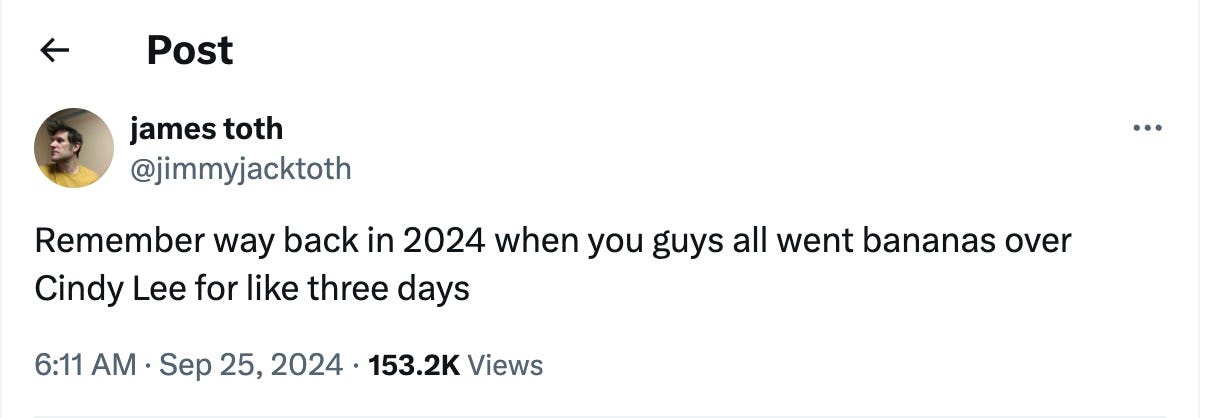
A lot of art in New York is blind to its regionalism and clings to inherited white-cube pretensions to transcendence. Win McCarthy’s show Kingdom Come at Francis Irv gallery, on the other hand, is unusually explicit in its local focus and its emphasis on the transient. It’s a grudging paean to the city, a statement of dedication to it against one’s better judgment. Or, looked at another way, it’s a weary declaration about the particular misery of moving from one apartment to the next to the next as a resident of—as our travel-happy mayor might put it—the Athens / Kyiv / Tel Aviv / ISTANBUL / Seoul / Islamabad / Zagreb / Lima / Mexico City /Dublin of America.
The show announces itself with an allusion to the plywood sheeting that signifies streetside construction, a foreshortened panel that bears an incomplete image of a lingerie ad made up of a few pasted-on photographic prints. All the other images in the small space are composed the same way, mostly to more elaborate, even expressive effect. An image of a panel van, for instance, is stretched via repeated wrinkled pastings into something like a frame-by-frame depiction of it turning a corner while also calling to mind a passenger train. The van bears the logo of a local demolition specialist, Alba, that operates a fleet of garbage trucks and other vehicles like the one McCarthy captured. There’s also, in its yellow hue, a metonymy with the iconic—and endangered, in the age of Uber—NYC taxicab.
(Sticking with the week’s corruption theme, Alba happens to be one of fourteen defendants indicted in a kickback scheme last year. They’ve also settled a federal lawsuit for cheating workers out of pay for $1.5 million.)
The other photocollages on the walls deploy fragmentation, duplication, wrinkling, and overlap to variously unsettle perspective, best illustrated in McCarthy’s rendering of a staircase, which in context suggests the dizzy view while struggling to hoist a couch over and around the balustrades. This vaguely Cubist imperative happens to have unexpected resonances with some shows currently up in Chelsea—Erin Schirreff’s distinctly modernist investigations, Pieter Schoolwerth’s lysergic ones. The year of Picasso bears fruit this fall?
A few objects on the ground anchor Kingdom Come, literally and otherwise. There are dozens of empty clear-plastic takeout containers of the sort you might order a lunch-special wonton soup in, or a quart of iced tea, and later repurpose for mixing paint. And then there’s the show’s stand-in for a prone figure, a pile of pale moving blankets folded and wrapped in plastic, strangely inert, a little deathly—a measly catafalque. Which hand-to-mouth space will you die in? If you think that take is too wrist-pressed-to-forehead, consult the exhibition text, a terrific unsigned poem presumably written by the artist. It ends:
Everyone.
First breath, last breath.
Everywhere.
Dark, then light, then dark.
Same second, same pulsing second. Same hour.Everyone idiot. Beautiful, beaming idiot.
Stand. Sit.
Always return
Always rent free from then.
Always, occurring. Until never.
Never was. Never once. Not at all.
Film

Obscurantists and masochists, take note! A 14-hour documentary on Documenta 14 makes its New York premiere at the New York Film Festival this week. While I’m an esoteric bastard who can get down with exhaustingly durational events of all sorts, in this case I’m also a partisan: I worked on Documenta 14 in 2016–17. You know the one—famously split between Athens and Kassel and famously disastrous for the finances of Documenta GmbH.
The director of exergue—on documenta 14, Dimitris Athiridis, would occasionally materialize in our office in an old apartment building in Exarchia, set up a camera with the tranquil detachment befitting a documentarian, and capture the banality and occasional drama of some weekly meeting or troubleshooting session. In the unfolding events that Athridis would churn into his own Greek epic (sorry, couldn’t resist), I was more or less an NPC, being a mere editor. But I’m assuming I turn up in at least one frame, where I will spill my smuggled-in beer and sputter at the screen DiCaprio style.
NYFF is showing the film in two long-haul sets of screenings, the first this Tuesday–Thursday, October 1–3, at 7 pm each night, the second Saturday and Sunday at noon. More info and tickets are available here. I’ll be opting for the seven-hour weekend marathons, but there is a free talk Wednesday at 5 pm featuring Athridis; Documenta 14’s artistic director, Adam Szymczyk; the brilliant filmmaker Naeem Mohaiemen; and the writer and curator Serubiri Moses.
A Good Cause

“When you look in the mirror, that clarified, specular image is different, supplying you with something you lack.” A definition of criticism? No; rather, they’re the words of Bernadette Van-Huy describing her drawing Mirror Stage (2023), available as an edition from quite possibly the best art magazine currently in operation, May Revue. The outfit has mounted a new fundraising drive that will, let’s hope, make their publishing schedule more officially and less aspirationally semi-annual.
Artists contributing to the effort include Jessica Stockholder, Heji Shin, Mark Kokopeli, Wade Guyton, and Mimosa Echard, whose strangely voluptuous saucers are glazed with a detail from Monet’s Water Lillies and encrusted with rust and glass nail-art microbeads. If you dig further into the archive, you can find great pieces by Josef Strau, Paulina Olowska, Seth Price, Jana Euler, and Amelie von Wullfen. A number of new and older editions are currently on exhibition in New York, now through October 17. Among them is Van-Huy’s Mirror Stage, each of the unique versions hung side by side to create a sense of the endlessness of the mystery of self-formation. Like Echard’s saucers, they’re available for a mere €500; some editions are even less.
If you’d like to see the works in person, you may make an appointment to do so by emailing anna@weistreichwagner.com. If you’re concerned about the state of art criticism and art in general, as so many profess to be, get off your ass and open your wallet: support May Revue.
Music
I’ve spent way too much time on Twitter lately, which correlates directly with my sense of despair, as usual. Amid increasingly feeble jokes about Eric Adams, this post caught my eye:
I thought smugly, Well, at least I managed to get Diamond Jubilee into Spigot before we all forgot about it. Then I decided to look up what nonsense I had spouted on the subject and realized that I hadn’t written about Cindy Lee at all.
If you missed all the hullabaloo a few months ago, Cindy Lee is a musical persona of Patrick Flegel, formerly of the band Women. Lee’s Diamond Jubilee, dead-alive with ghostly tweaked overdub harmonies, is akin to a roll in crunchy autumnal leaves that fell off the Brian Wilson tree. You also hear traces of ’70s rock acts like Big Star or even glammier bands, and of course girl groups. (Would there be any post-’60s American song without Motown? Yes, I know Flegel hails from Calgary.) Diamond Jubilee sounds like it was released not in 2024 but rather ca. 1991 on the acid-head bottom-of-a-well label Shimmydisc, who managed to release everything from Galaxie 500 to Ween, Bongwater to Boredoms. Unsurprisingly, then, Lee’s record is a Pitchfork wet dream—9.1, and I’m not sure what led them to dock that 0.9.
When it appeared in April, Diamond Jubilee ignited to the tune of one million views on YouTube, then indeed seemed to disappear from public consciousness. The arc of its reception was more or less preordained by the manner of its release: it was made available only on YouTube and, for donation, as a download from the glorious Geocities page for Lee’s label, Realistik Studios. No Apple or Spotify, not even physical copies. It only seemed like a gimmick, however, if you were (like admittedly myself) new to Flegel’s scene: Diamond Jubilee was in fact the seventh album under the Lee moniker, all issued in staunchly indie formats and quantities: her previous album, Cat O’Nine Tails (2020), was similarly made available digitally only on the Geocities site, plus in a pressing of 50 vinyl copies.
Lee ended up cancelling much of a tour in support of the record, and not a lot of news emerged in the interim—until some ten days ago, when she released an animated video for one of the album’s tracks, “If You Hear Me Crying.” My favorite track, by chance, bears the same title as Win McCarthy’s show at Francis Irv—“Kingdom Come.” Lee’s chiming ending, quoted below, is a selenic version of how McCarthy brings his Becketty, sublunary poem to a close:
I miss you, dear friend
I heard your music playing far away
I'll cross my fingers for another day
Til the kingdom comeDon't tell me it's the end
I only want to see your face again.




